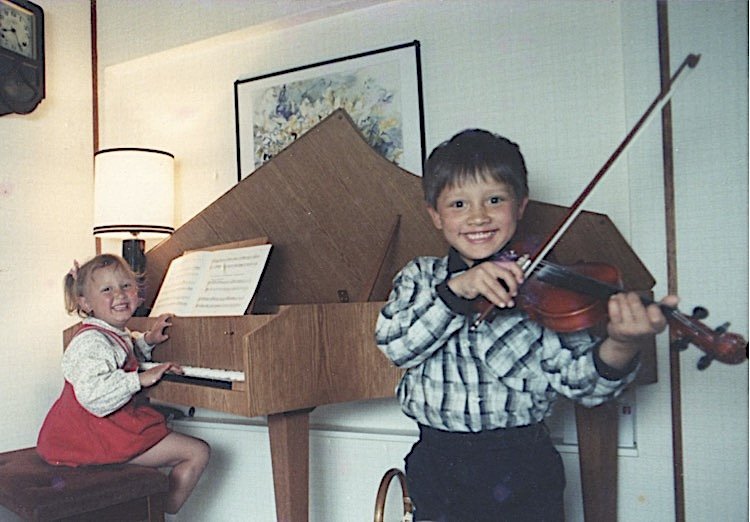バイリンガルの子どもを育てる
2024年5月28日 14時04分
イギリス在住のネイティブ校閲者が、
バイリンガル育児について考えを聞かせてくれました。
自身もイギリスとフランスの2か国にルーツを持ちながら、
イギリスと日本のミックスのお子さんを育ててきた校閲者。
その視点はとても興味深く、たくさんの気付きを与えてくれました。
ぜひ記事をお楽しみください。
※英語原文は日本語記事の下に掲載しています。
私の子どもたちは日本で生まれましたが、
私たち夫婦は彼らに英語と日本語の両方で話しかけてきました。
息子と娘が2つの言語に同時に触れていることで、
彼らのアイデンティティが混乱するのではないかと
近所の人たちから心配されることもありましたが、
私は「テニスとサッカーの両方をやっているとしたら、
テニスをプレイしている最中に間違えて
ボールを蹴ってしまうことはまずないですよね」と答えていました。
どのスポーツも、言語と同じように、
それぞれに本能的に従うルールがあります。
私がイギリスで育ったとき、
フランス人である母はフランス語で私に話しかけていました。
それに対して私は英語で返事をしていたので、母の気に障ったようですが、
それでもフランス人の友人や親戚を訪ねてフランスに行ったときには、
私は彼らと容易にフランス語で話すことができました。
同じように、私の子どもたちも日本で生まれて間もない頃は、
私が英語で話しかけるといつも日本語で返事をしていました。
私には、日本人の妻を持つ英語話者の友人が何人かいましたが、
彼らの子どもたちが、男性は英語で話し、女性は日本語で話すと
信じているようだったのは面白かったです。
私の子どもたちも、当時来日して間もない私の日系アメリカ人の友人から
英語で話しかけられると戸惑っていました。
スーパーマーケットの買い物客や電車に乗っている人たちが、
小さい頃は金髪だった私の子どもたちが
母親と完璧な大阪弁で話しているのを見て驚くなど、
他にも面白い場面はいくつかありました。
私たちが日本からウェールズに引っ越したとき、
2人の子どもは7歳と9歳でした。
村の学校の先生たちは、2人が英語をよく理解しているのに
話さないことに驚いていましたが、
数週間後には学校の友達と楽しそうに会話をしていました。
2人が学校でけん玉ブームを起こし、
その流行が数か月ほど続いたことを覚えています。
家では英語と日本語を交えて会話しており、
どちらの言語を使っているかはあまり意識していませんでした。
次女はここウェールズで生まれましたが、
家では毎日日本語を聞いていたので、日本語も流暢です。
現在41歳の息子からは、母親に対してはいつも英語ではなく
日本語で話しかけていたと最近言われましたが、
私は全く気が付きませんでした。
これらのことから私がたどり着いた結論は、
親が子どもをバイリンガルにするために必要な努力は、
子供を自然で堅苦しくない方法で言語に触れさせること以外には
あまり必要ないということです。
私の子どもたちは3人とも本能的に日本語と英語を流暢に操り、
それぞれの国で異なる社会的アイデンティティを
まったく問題なく受け入れています。

楽器を演奏する校閲者の子たち(幼少時)
(英語原文)
Bringing up bilingual children
Our children were born in Japan, and my wife and I spoke to them in both English and Japanese. The neighbors sometimes expressed concern that our son and daughter’s identities might become confused by being exposed to two languages at the same time, but I replied to them that if you play both tennis and soccer, you are unlikely to kick the ball by mistake when playing tennis. Each sport, like each language, has its own rules that you instinctively follow. When growing up in England, my French mother spoke to me in her language. I replied in English, which annoyed her; but I found it easy to speak with my French friends and relatives when visiting them in France. My children behaved the same in their early years in Japan: I spoke English to them and they always replied in Japanese. I had several friends who were English speakers with Japanese wives, and was amused that their children seemed to believe that men spoke English and women spoke Japanese. My children, too, were puzzled when one of my friends, a Japanese American who had recently arrived in Japan, talked to them in English. There were some other funny situations, such as supermarket shoppers and people on trains being startled to see my children, who had blond hair when they were small, speaking with their mother in perfect Ôsaka-ben. When we moved from Japan to Wales, our two children were 7 and 9 years old. The teachers at our village school were surprised that they could understand English very well, but didn’t speak it; but after a few weeks, they were talking happily with their schoolfriends. I remember that they started a kendama craze at their school that lasted for several months. At home we spoke a mixture of English and Japanese, not really noticing which language we were using. Our second daughter was born here in Wales but is also fluent in Japanese, having heard it every day at home. My son, now 41, recently pointed out to me that he always spoke to his mother in Japanese, not in English. I had never noticed. My conclusion from all this is that not much effort is needed from parents to encourage their children to be bilingual, other than to expose their children to languages in a natural and informal way. All three of my children are instinctively fluent in Japanese and English, and they are completely comfortable with their different social identities in each country.
バイリンガル育児について考えを聞かせてくれました。
自身もイギリスとフランスの2か国にルーツを持ちながら、
イギリスと日本のミックスのお子さんを育ててきた校閲者。
その視点はとても興味深く、たくさんの気付きを与えてくれました。
ぜひ記事をお楽しみください。
※英語原文は日本語記事の下に掲載しています。
私の子どもたちは日本で生まれましたが、
私たち夫婦は彼らに英語と日本語の両方で話しかけてきました。
息子と娘が2つの言語に同時に触れていることで、
彼らのアイデンティティが混乱するのではないかと
近所の人たちから心配されることもありましたが、
私は「テニスとサッカーの両方をやっているとしたら、
テニスをプレイしている最中に間違えて
ボールを蹴ってしまうことはまずないですよね」と答えていました。
どのスポーツも、言語と同じように、
それぞれに本能的に従うルールがあります。
私がイギリスで育ったとき、
フランス人である母はフランス語で私に話しかけていました。
それに対して私は英語で返事をしていたので、母の気に障ったようですが、
それでもフランス人の友人や親戚を訪ねてフランスに行ったときには、
私は彼らと容易にフランス語で話すことができました。
同じように、私の子どもたちも日本で生まれて間もない頃は、
私が英語で話しかけるといつも日本語で返事をしていました。
私には、日本人の妻を持つ英語話者の友人が何人かいましたが、
彼らの子どもたちが、男性は英語で話し、女性は日本語で話すと
信じているようだったのは面白かったです。
私の子どもたちも、当時来日して間もない私の日系アメリカ人の友人から
英語で話しかけられると戸惑っていました。
スーパーマーケットの買い物客や電車に乗っている人たちが、
小さい頃は金髪だった私の子どもたちが
母親と完璧な大阪弁で話しているのを見て驚くなど、
他にも面白い場面はいくつかありました。
私たちが日本からウェールズに引っ越したとき、
2人の子どもは7歳と9歳でした。
村の学校の先生たちは、2人が英語をよく理解しているのに
話さないことに驚いていましたが、
数週間後には学校の友達と楽しそうに会話をしていました。
2人が学校でけん玉ブームを起こし、
その流行が数か月ほど続いたことを覚えています。
家では英語と日本語を交えて会話しており、
どちらの言語を使っているかはあまり意識していませんでした。
次女はここウェールズで生まれましたが、
家では毎日日本語を聞いていたので、日本語も流暢です。
現在41歳の息子からは、母親に対してはいつも英語ではなく
日本語で話しかけていたと最近言われましたが、
私は全く気が付きませんでした。
これらのことから私がたどり着いた結論は、
親が子どもをバイリンガルにするために必要な努力は、
子供を自然で堅苦しくない方法で言語に触れさせること以外には
あまり必要ないということです。
私の子どもたちは3人とも本能的に日本語と英語を流暢に操り、
それぞれの国で異なる社会的アイデンティティを
まったく問題なく受け入れています。

楽器を演奏する校閲者の子たち(幼少時)
(英語原文)
Bringing up bilingual children
Our children were born in Japan, and my wife and I spoke to them in both English and Japanese. The neighbors sometimes expressed concern that our son and daughter’s identities might become confused by being exposed to two languages at the same time, but I replied to them that if you play both tennis and soccer, you are unlikely to kick the ball by mistake when playing tennis. Each sport, like each language, has its own rules that you instinctively follow. When growing up in England, my French mother spoke to me in her language. I replied in English, which annoyed her; but I found it easy to speak with my French friends and relatives when visiting them in France. My children behaved the same in their early years in Japan: I spoke English to them and they always replied in Japanese. I had several friends who were English speakers with Japanese wives, and was amused that their children seemed to believe that men spoke English and women spoke Japanese. My children, too, were puzzled when one of my friends, a Japanese American who had recently arrived in Japan, talked to them in English. There were some other funny situations, such as supermarket shoppers and people on trains being startled to see my children, who had blond hair when they were small, speaking with their mother in perfect Ôsaka-ben. When we moved from Japan to Wales, our two children were 7 and 9 years old. The teachers at our village school were surprised that they could understand English very well, but didn’t speak it; but after a few weeks, they were talking happily with their schoolfriends. I remember that they started a kendama craze at their school that lasted for several months. At home we spoke a mixture of English and Japanese, not really noticing which language we were using. Our second daughter was born here in Wales but is also fluent in Japanese, having heard it every day at home. My son, now 41, recently pointed out to me that he always spoke to his mother in Japanese, not in English. I had never noticed. My conclusion from all this is that not much effort is needed from parents to encourage their children to be bilingual, other than to expose their children to languages in a natural and informal way. All three of my children are instinctively fluent in Japanese and English, and they are completely comfortable with their different social identities in each country.



